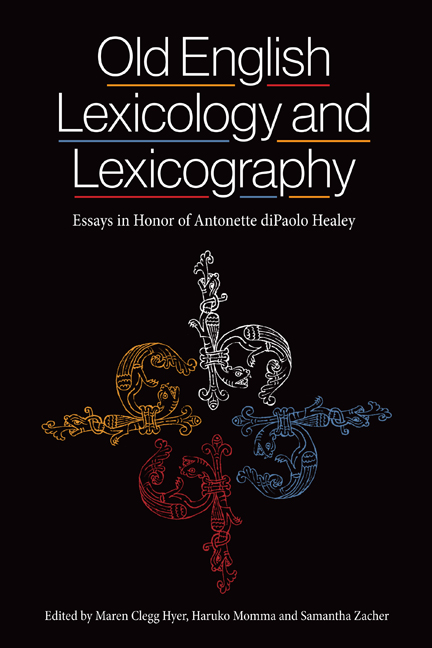Book contents
- Frontmatter
- Dedication
- Contents
- List of Illustrations
- List of Contributors
- Acknowledgements
- Abbreviations
- Introduction
- I Old English Poets and their Word-Craft
- 1 Beowulf and the Art of Invention
- 2 Juliana 53a Revisited (hætsð hæþenweoh)
- 3 Wounds and Compensation in the Old English Soul and Body Poems
- II Old English Homiletic Tradition
- 4 Defining and Redefining: Ælfric's Access to Gregory's Homiliae in Evangelia in the Composition of the Catholic Homilies
- 5 Lambeth Homily 4 and the Textual Tradition of the Visio Pauli
- 6 ‘A Vision of Souls’: Charity, Judgment, and the Utility of the Old English Vision of St. Paul
- 7 The Vocabulary of Sin and the Eight Cardinal Sins
- III Anglo-Saxon Institutions
- 8 The King (and Queen) and ‘I’: Self-Construction in Some Anglo-Saxon Royal Documents
- 9 Anglo-Saxon Maccabees: Political Theology in Ælfric's Lives of Saints
- 10 Nunne in Early Old English: Misogyny in its Literary Context
- IV Lexis of the Quotidian
- 11 Cingulum est custodiam: Semiotics and the Semantic Range of gyrdels
- 12 Island Time: The English Day and the Christian Hours
- 13 ‘Revising Hell’: The Voices of Teachers in Anglo-Saxon Studies and Anglo-Saxon England
- V The Task of the Lexicographer
- 14 Cryptography and the Lexicographer: Codifying the Code
- 15 Genre and the Dictionary of Old English
- Epilogue: Word-Hord
- 16 Reading Beowulf with Isidore's Etymologies
- An Old English Lexicon Dedicated to Toni Healey
- Toni Healey: A Tribute
- List of publications of Antonette diPaolo Healey
- Index
- Tabula Gratulatoria
- Miscellaneous Endmatter
- Anglo-Saxon Studies
5 - Lambeth Homily 4 and the Textual Tradition of the Visio Pauli
Published online by Cambridge University Press: 17 September 2020
- Frontmatter
- Dedication
- Contents
- List of Illustrations
- List of Contributors
- Acknowledgements
- Abbreviations
- Introduction
- I Old English Poets and their Word-Craft
- 1 Beowulf and the Art of Invention
- 2 Juliana 53a Revisited (hætsð hæþenweoh)
- 3 Wounds and Compensation in the Old English Soul and Body Poems
- II Old English Homiletic Tradition
- 4 Defining and Redefining: Ælfric's Access to Gregory's Homiliae in Evangelia in the Composition of the Catholic Homilies
- 5 Lambeth Homily 4 and the Textual Tradition of the Visio Pauli
- 6 ‘A Vision of Souls’: Charity, Judgment, and the Utility of the Old English Vision of St. Paul
- 7 The Vocabulary of Sin and the Eight Cardinal Sins
- III Anglo-Saxon Institutions
- 8 The King (and Queen) and ‘I’: Self-Construction in Some Anglo-Saxon Royal Documents
- 9 Anglo-Saxon Maccabees: Political Theology in Ælfric's Lives of Saints
- 10 Nunne in Early Old English: Misogyny in its Literary Context
- IV Lexis of the Quotidian
- 11 Cingulum est custodiam: Semiotics and the Semantic Range of gyrdels
- 12 Island Time: The English Day and the Christian Hours
- 13 ‘Revising Hell’: The Voices of Teachers in Anglo-Saxon Studies and Anglo-Saxon England
- V The Task of the Lexicographer
- 14 Cryptography and the Lexicographer: Codifying the Code
- 15 Genre and the Dictionary of Old English
- Epilogue: Word-Hord
- 16 Reading Beowulf with Isidore's Etymologies
- An Old English Lexicon Dedicated to Toni Healey
- Toni Healey: A Tribute
- List of publications of Antonette diPaolo Healey
- Index
- Tabula Gratulatoria
- Miscellaneous Endmatter
- Anglo-Saxon Studies
Summary
There can be no doubt that Toni Healey's most important contribution to Anglo-Saxon studies has been her visionary leadership of the Dictionary of Old English, first as Co-Editor from 1985 to 1989, then as Editor from 1989 to her retirement in 2014. Her boundless energy and enthusiasm for furthering the work of the DOE kept this important enterprise alive and well through many trials, and she continues to benefit the project by sharing her expertise and wisdom with current staff members, including myself.
Her key role in such a monumental undertaking as the Dictionary of Old English may, however, threaten to overshadow another part of Toni Healey's scholarly legacy: her editio princeps of an Old English homily based on one of the Long Versions of the apocryphon usually called the Visio Sancti Pauli. Healey's excellent edition of this homily (DOE short title HomM 1) and her study of its sources laid the groundwork for later research on the influence of the Visio Pauli on Old English texts, and, thanks in part to her work, the Visio is now recognized as one of the most important sources of medieval Insular ideas about judgment, heaven, and hell. In the present essay, I hope to build on the work of Healey and other scholars in bringing to light some evidence for a hitherto unknown redaction of the Visio Pauli, which seems to have been the source for an early Middle English homily.
London, Lambeth Palace, MS 487 was written around the year 1200 in the West Midlands. It contains, alongside a copy of the Poema morale, seventeen English homilies, four of which go back in whole or in part to Old English texts by Ælfric and Wulfstan. Most of the fourth homily in Lambeth 487 (hereafter Lambeth 4) is an account of a tour of hell taken by St Paul, in which Michael the Archangel shows him the punishments of several classes of sinners, along with various other horrors. At the conclusion of this tour, Paul and Michael successfully entreat God to give the damned a respite from their torments every Sunday until the Last Judgment. Anyone familiar with the Visio Pauli will immediately identify the outline of this story, and the homily has long been recognized as a vernacular adaptation of some version of the apocryphon.
- Type
- Chapter
- Information
- Old English Lexicology and LexicographyEssays in Honor of Antonette diPaolo Healey, pp. 80 - 93Publisher: Boydell & BrewerPrint publication year: 2020

